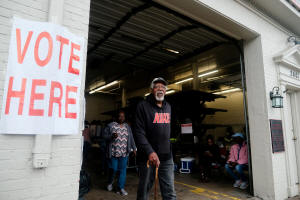US Supreme Court backs Alabama Black voters, bolsters civil rights law
 Send a link to a friend
Send a link to a friend
 [June 09, 2023]
By John Kruzel [June 09, 2023]
By John Kruzel
WASHINGTON (Reuters) -The U.S. Supreme Court on Thursday handed a major
victory to Black voters who challenged a Republican-drawn electoral map
in Alabama, finding the state violated a landmark law prohibiting racial
discrimination in voting and paving the way for a second congressional
district with a Black majority or close to it.
The 5-4 ruling authored by Chief Justice John Roberts affirmed a lower
court's decision that the map diluted the voting power of Black
Alabamians, running afoul of a bedrock federal civil rights law, the
1965 Voting Rights Act. Roberts was joined by fellow conservative
Justice Brett Kavanaugh and the court's three liberals, Sonia Sotomayor,
Elena Kagan and Ketanji Brown Jackson.
With Thursday's ruling, the Supreme Court elected not to further roll
back protections contained in the Voting Rights Act as it had done in
two major rulings in the past decade. The decision centered upon Section
2 of the Voting Rights Act, a provision aimed at countering measures
that result in racial bias in voting even absent racist intent.
"We find Alabama's new approach to (Section 2) compelling neither in
theory nor in practice," Roberts wrote. "We accordingly decline to
recast our (Section 2) case law as Alabama requests."

At issue was the map approved in 2021 by the Republican-controlled state
legislature setting the boundaries of Alabama's seven U.S. House of
Representatives districts. The map featured one majority-Black district,
with six majority-white districts, even though Black people comprised
27% of Alabama's population.
The ruling on Thursday affirmed the lower court's order that Alabama
configure a second House district where Black voters could hold a "a
voting-age majority or something quite close to it." That marked a shift
from an emergency 5-4 ruling the court issued last year that let Alabama
use the disputed map for the 2022 U.S. congressional elections in which
Republicans seized control of the House from Democrats.
The new congressional map, expected to be in place for the 2024
elections, could boost Democratic efforts to regain a majority in the
House, which Republicans now control by a narrow 222-212 margin.
U.S. Attorney General Merrick Garland hailed the ruling, saying it
"rejects efforts to further erode fundamental voting rights protections,
and preserves the principle that in the United States, all eligible
voters must be able to exercise their constitutional right to vote free
from discrimination based on their race."
The Voting Rights Act was passed at a time when Southern states
including Alabama enforced policies blocking Black people from casting
ballots. Nearly six decades later, race remains a contentious issue in
American politics and society more broadly.
Conservative states and groups had previously succeeded in prodding the
Supreme Court to limit the Voting Rights Act's scope. Its 2013 ruling in
another Alabama case struck down a key part that determined which states
with histories of racial discrimination needed federal approval to
change voting laws. In a 2021 ruling endorsing Republican-backed Arizona
voting restrictions, the justices made it harder to prove violations
under Section 2.
[to top of second column]
|

A voter is seen exiting a polling
station at the Selma Fire Station on Super Tuesday in Selma, Alabama
, U.S., March 3, 2020. REUTERS/Michael A. McCoy/File Photo

'TEXTBOOK EXAMPLE'
Black voters and advocacy groups who sued Alabama argued that the
state's map reduced the influence of Black voters by concentrating
their voting power in one district while distributing the rest of
the Black population in other districts at levels too small to form
a majority. A three-judge federal court panel last year sided with
the challengers.
Abha Khanna, who argued the case on behalf of one set of
challengers, said, "Thankfully, the court today identified Alabama's
redistricting scheme as a textbook violation of the landmark civil
rights law," Khanna said.
The Supreme Court has a 6-3 conservative majority and, based on the
questioning during oral arguments in the case in October, had
appeared to lean toward favoring Alabama.
UCLA School of Law election law expert Rick Hasen said that "to have
Roberts and Kavanaugh join the liberals in upholding the Voting
Rights Act is a big surprise, and a good result for minority
voters."
Conservative Justices Clarence Thomas and Samuel Alito wrote
separate dissenting opinions. Thomas wrote that the question before
the court was whether Section 2 required Alabama "to intentionally
redraw its longstanding congressional districts so that black voters
can control a number of seats roughly proportional to the black
share of the state's population."
Thomas wrote, "Section 2 demands no such thing, and, if it did, the
Constitution would not permit it."
Alabama officials argued that drawing a second district to give
Black voters a better chance at electing their preferred candidate
would itself be racially discriminatory by favoring them at the
expense of other voters. If the Voting Rights Act required the state
to consider race in such a manner, according to Alabama, the statute
would violate the U.S. Constitution's 14th Amendment guarantee of
equal protection under the law.

Electoral districts are redrawn each decade to reflect population
changes as measured by a national census, last taken in 2020. In
most states, such redistricting is done by the party in power, which
can lead to map manipulation for partisan gain.
(Reporting by John Kruzel in Washington; Additional reporting by
Andrew Chung; Editing by Will Dunham)
[© 2023 Thomson Reuters. All rights
reserved.]This material may not be published,
broadcast, rewritten or redistributed.
Thompson Reuters is solely responsible for this content.
 |